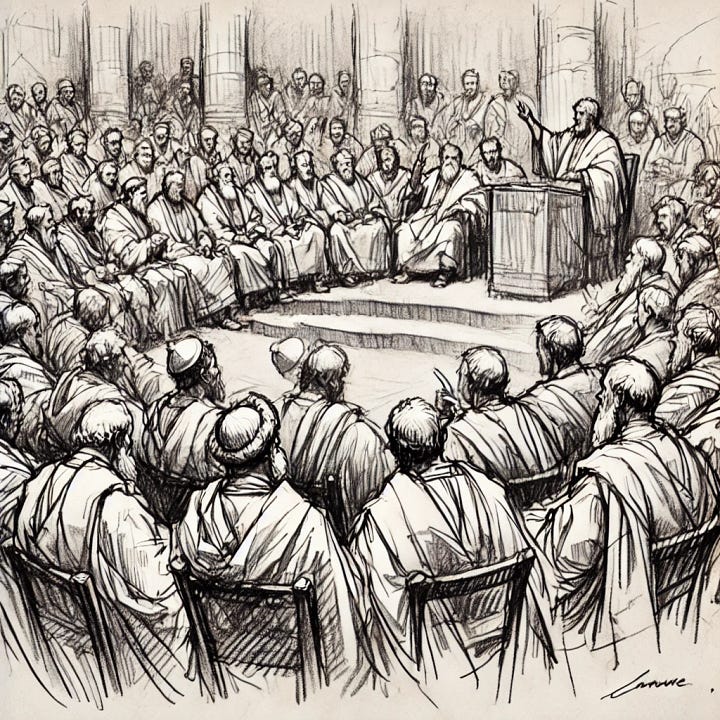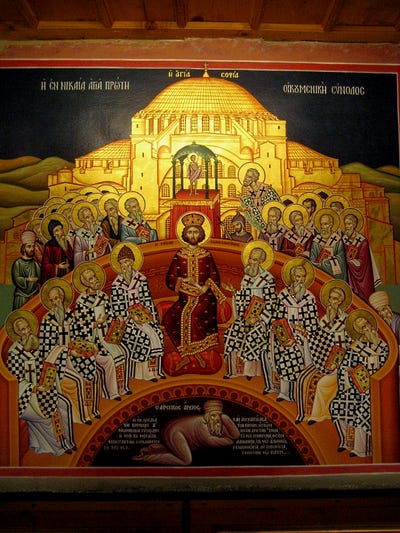Albert's Christmas Journey 🎄 2nd Letter
At the Council of Nicaea - Why Christmas is celebrated on the 25th
Did you miss the first letter or prefer real letters? See the bottom of this story.
My friend living in the future,
Today, I’m writing to you from the beautiful Lake Ascania. Surrounded by rolling hills, I’m in Nicaea, which is located in what will be Turkey in your time. Right now—in the year 325 A.D—it is part of the Roman Empire.
When I arrived this morning, I didn’t know what to expect, but I could already feel that something big was about to happen. Nicaea strikes me as a busy city, a crossroads of trade and culture, but something seemed off. The locals, normally used to and unfazed by all the buzz, acted strangely. I could see them observing the people in the streets, and as I paid closer attention, I realized that they were all bishops heading towards the Imperial Palace by the lake.
“Where’s everyone heading?” I asked one of them. The question amused him, as he probably didn’t expect anyone not to know about the elemental event going on. As you know, one of the oddities of my time travels is that everyone is extremely welcoming and open to talk to me, and that’s how it was this time. “You know what, why don’t you see for yourself?” he asked me, and we started heading to the palace together.
The palace was impressive—giant stone walls, tall windows, and rows of lamps casting a steady glow over the room. And at one end of the room, I saw, dressed in a purple cloak, the Roman Emperor Constantine I. I must admit that I’m still star-struck meeting anyone of his significance, and I started to realize where I was: I’ve managed to become part of the Council of Nicaea, where church leaders are gathered to discuss some big questions about the Christian faith. Emperor Constantine brought together bishops and church leaders from across the Roman Empire to resolve key theological disputes, including the nature of Christ and the establishment of unified traditions for the rapidly growing Christian faith. These disputes arose because Christianity, until recently an underground and often persecuted religion, had, during its recent growth, developed different traditions and interpretations across various regions.
The atmosphere inside the hall is focused and intense. My new friend turned out to be none other than Alexander of Alexandria, who came from Egypt and was deeply invested in the council to defend the doctrine of Christ’s divine nature against the teachings of Arius, whose views had sparked significant theological conflict within the church. Arius, a priest also from Alexandria, taught that Christ was not eternal but created by God the Father, making Him subordinate and distinct from the Father. These views challenged the doctrine of the Trinity, sparking significant division within the church and prompting the Council of Nicaea to address the controversy.
However, this morning, they debated a different issue, which surprised me: when to celebrate the birth of Christ. It turns out that, up until now, there hasn’t been a set date. Some communities celebrate in January, others at different times of the year. Now they’re considering making December 25th the official day, and the reasoning behind it is fascinating:
December 25th aligns with the Roman festivals, marking the return of longer days. The bishops see a deep connection between this and the birth of Christ, calling Him the “true light of the world.” By placing His birth on the same day as the festival, they hope to connect the Christian faith to something people already celebrate—making the transition easier for those who still hold on to pagan traditions. One bishop from Gaul stood up and explained: “The 25th is the day on which hope returns and the darkness begins to retreat. What better day to celebrate the coming of Christ, who brings light to the world?” It was simple but struck a chord with many in the room.
Not everyone agrees, of course. Some argue for January 6th, which many in the eastern regions already celebrate as the Epiphany, marking the visit of the Magi. But the idea of December 25th seems to be gaining ground and by mid-afternoon, I could sense that most of the council was leaning toward it. Emperor Constantine didn’t say much during these debates, but his presence was impossible to ignore. You can tell that his goal is unity, to bring people together under one faith and one set of traditions.


But how is this topic even up for debate? The date of Christ’s birth was unknown because the Gospels do not mention it explicitly. Early Christians focused more on His death and resurrection, which were central to their faith, rather than His birth. As the church grew and gained official recognition, there was a need to consolidate beliefs and practices, creating a unified framework for the faithful across the large and diverse Roman Empire.
What strikes me most is how practical and “non-divine” these decisions are. The bishops aren’t just focused on theology—they think about unifying people and making the faith accessible. They want this new tradition to feel familiar and tied to things people already celebrate while giving it new meaning.
As I write this, I’ve left the debate and found a resting place by the lake. The sun is setting, and the council is taking a break before they reconvene for evening discussions. In total, the discussions will last from May to August. Looking out at the water, I can’t help but think how this simple decision—choosing a date—will echo through history. December 25th will become a symbol of hope and light, not just for those in this room but for billions of people to come.
My friend, when you celebrate Christmas this year, remember this moment. It’s not just about the traditions we know today but about how they started—with a group trying to bring faith and light into the darkest days of winter. Traditions don’t appear out of nowhere, but they are carefully considered attempts by our ancestors to improve our lives today based on their experience.
Maybe you can start a tiny new tradition for your family this year. For example, I, traveling far away from my family, not only in space but also in time, made it my personal tradition to reach out to everyone important to me on the 25th and ask them where they are celebrating this year.
Until next time, where- and whenever that might be,
Albert
🧳
PS: Did you know you can receive these stories as real letters, including additional designs and extras - Making this journey even more special?
All you have to do is pay for the stamps:)
Also, if you missed the first story, you can read it here.
🎄




